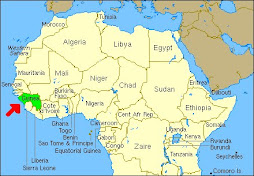
At my request, and after healing from all the joys
I went to
Both goals were met, and then some! I had a great visit with Fleurange, but such travel is not for the faint-hearted! Life in her world, as far is creature comforts go, is a bit like what we Louisianians would call ‘hurricane mode’ (few creature comforts as the storm passes and in the aftermath when services are out).
The people were very welcoming. Being ‘the Mama who has come from the
We were invited into numerous homes and dined with several families. It was obvious to me that they were intent on honoring us, and it was a humbling experience for me.
The climate in
Transportation is one of the areas that shocks the average American. I grew up in the country on a gravel road in the late 50’s and early 60’s, before we got blacktop. I remember the dust. Most of the roads, in Mokolo, and even many in the bigger towns, are not gravel, but dirt and rocks or stones or boulders!! One has a jarring experience on most bus rides, and the moto (motorcycles for hire) drivers have my greatest respect for the way they avoid so many big rocks and potholes, while keeping passengers from landing on the street! You have not lived until you have survived a one-hour-plus ride on the back of a moto, to view the sights at the western border near
Sanitation (or lack thereof) was a significant area of concern for me. It is true that I grew up in the country in the days before AC, microwaves, internet, and cell phones, and if we lost power, we were also without water because the pump for the well was electric. But in
The food was interesting. A principal dish is the couscous, different from the Americanized version one buys here in a box. It is sort of like a firm mush (thick grits for Southerners), which can be made from rice, corn, or millet. This is served with flavorful sauces made from peanut oil, leaves, various seasonings. The procedure is to use your fingers, grab a chunk of couscous, dip in the sauce, and eat. Another popular dish is beans and beignets (street food), tasty, but then again, look at all the (clean?) hands that prepared it. The beignets (fried bread, sometimes yeast-raised) were somewhat familiar to me, reminiscent of the sweet beignet that is popular in
There is much more I could tell, but we would be here all day. The sights, sounds, smells were of a different world. To be there was an amazing experience! (Yet I do not plan a repeat trip unless the Peace Corps calls me and says ‘Get over here; your daughter is in trouble’, in which case I would be on a plane within 24 hours!) For one considering such a trip to
*************
So, that’s it from my Mama… and a few last observations and pictures of my own…
Age wins: I can’t wait to have my birthday next month!! Why? Cause it is COOL to be OLD in
Mom makes an entrance: I can’t help but crack a smile every time I think of Mom’s first contact with Mokolo. We had survived the entire long trip North to my post unscathed (although not without snafus a plenty!!) We were taking motos to my house from the bus station, with all our luggage. Finally, in the instant it’s time to dismount the moto, I’m deciding between which to do first: pay my moto driver, pay Mom’s moto driver, greet the mass of my neighbors who are running up to greet us, pull luggage off the moto, or help Mom undo her moto helmet. Mom makes the decision easy for me as slowly she goes Ploppppp! descending not so gracefully onto her bottom on the dirt road next to her moto. We’d come so far! It was only the dismount that was left!! Balancing on two legs can be tricky! I don’t think my neighbors knew how to react—the reverence for Mama Fleurange! might have been cancelled out by seeing her sprawled on the dirt road! Mom’s a great sport, brushed herself off (with some help from her daughter to take off that moto helmet) and got up to promptly greet everyone. The neighbors loved her instantly!
Nursing home preview: As Mom likes to say, this is what it’ll be like when I’m old and infirm! It’s always a fun role reversal when you get to take care of your parents. I was constantly talking, translating French/English, generally instructing, clarifying… I think my favorite image is of “How to ride a moto 101.” (Obviously, not enough time was spent on the sub-lesson, “How to dismount a moto!”) The first time we got on motorcycles, I had to remember this is not a standard and all-encompassing form of transportation in the
Afro-Caribbean connections: A favorite last memory is Mom’s ever-keen observations as she soaks up all of
“Now those drums are reminiscent of the
“Mom. That’s Bob Marley.”
“Oh.”
(I told Mom she was allowed to make as much fun of me as she wanted in her write-up of
Lovely Yaoundé, capital of

A cool roadside shot Mom got from the bus.

I’m telling my co-workers at the MC2 that when Americans take pictures, we smile, and could they please pleaaaase smile? (This is apparently funny.)

I’d asked Mom to bring over marshmallows—cultural exchange at its finest. I’m demonstrating how to roast the marshmallow that is speared on my spoon, while Bouba examines the marshmallow bag.

Mom practices being a grandmother with Bouba’s baby girl, Aïcha. N.B. It’s over 80 degrees at the time of that photo. Wrap that baby up tight!!

With Aissatou, my favorite neighbor, who fed us a lovely meal.

Mom was always good at making friends! (And yes, every one is wearing Mardi Gras beads that Mom brought over. What a hit. The neighbors are still wearing them!)

Friend Yves has us over for dinner and I plan to steal a baby :) His wives made us delicious chicken.

More food: here’s tasty couscous and sauce! Break it, dip it, love it! This couscous is made from red millet, with a sesame seed sauce. (Dad, just wait til I make you some of that!! Mmmmm :)

Mom communes with/is in awe of nature when I make her go hiking in Rumsiki. (She is seriously a good sport!!)

While in Rumsiki, we visited the Crab Sorcerer to learn about the future. He translates our questions to his crab, who then responds by moving little shards of clay in a pot to indicate certain answers. We learned that Paul Biya is going to “win” another Cameroonian presidential election in 2011 (quel surprise!) and that

Here’s the omniscient Crabby himself. Photographable for 500 F. Clever boogar.

(Before tourists came, the Crab Sorcerer and his crab predicted the annual harvest, a tradition passed on from his father, and grandfather before him.)
Crab Sorcerer takes a liking to my Mother. Mom is sufficiently reverent.

I agree with the Crab Sorcerer that it sure was wonderful to have her here. I’ll attach her helmet any day. Hopefully this Mama-fix will last me until I get back to the states next August!




















































